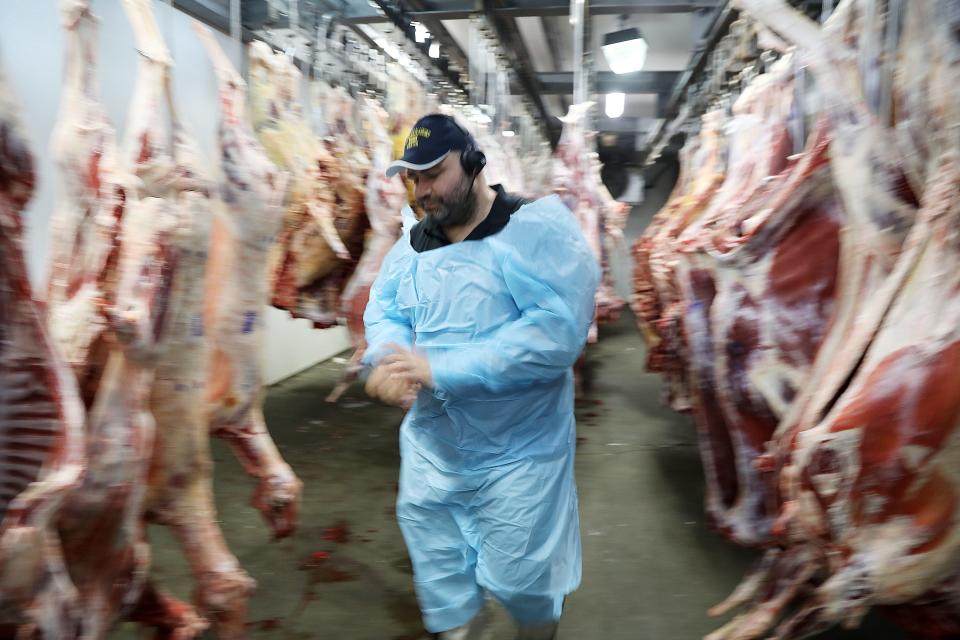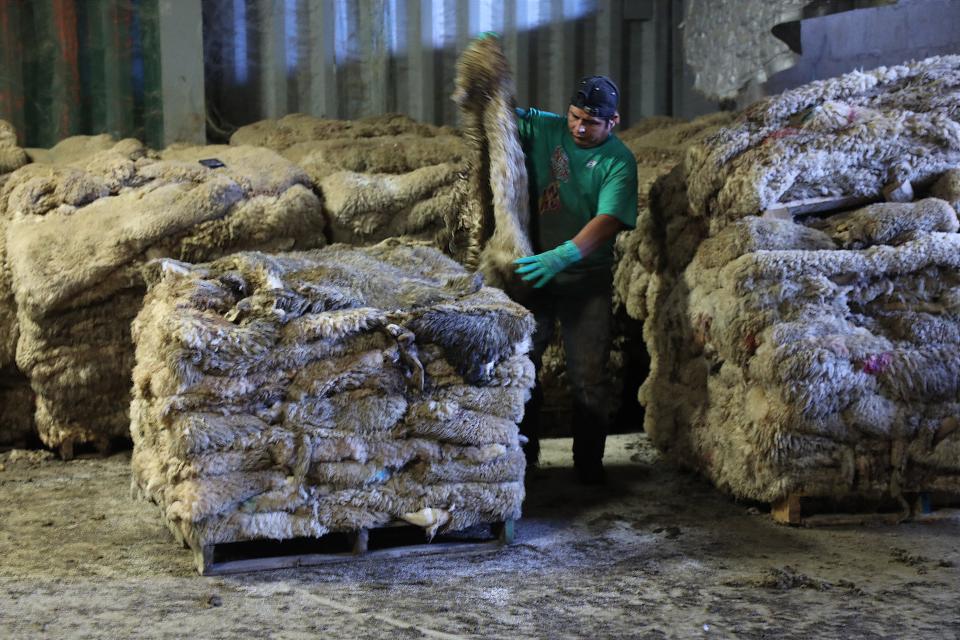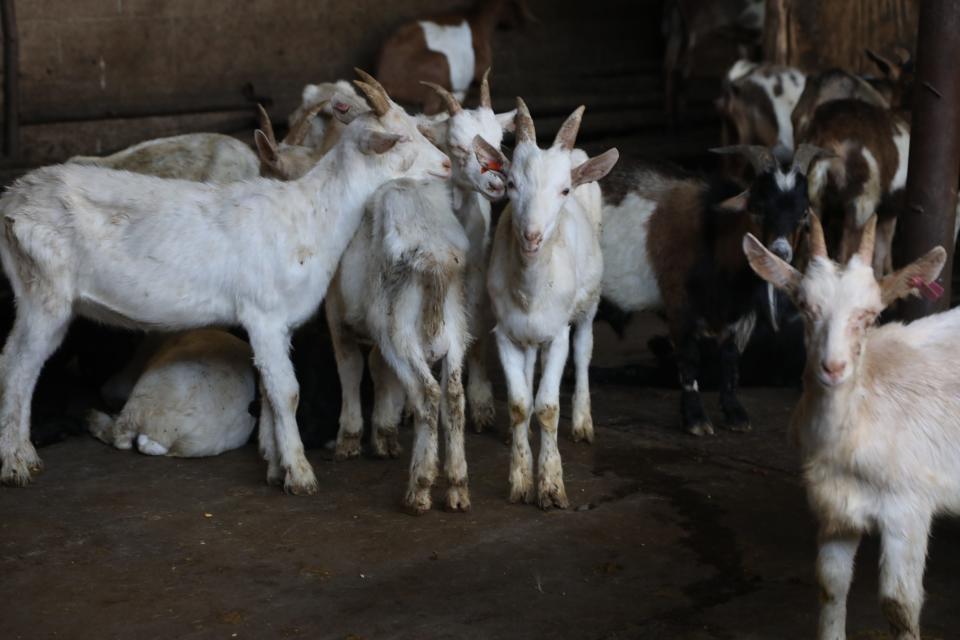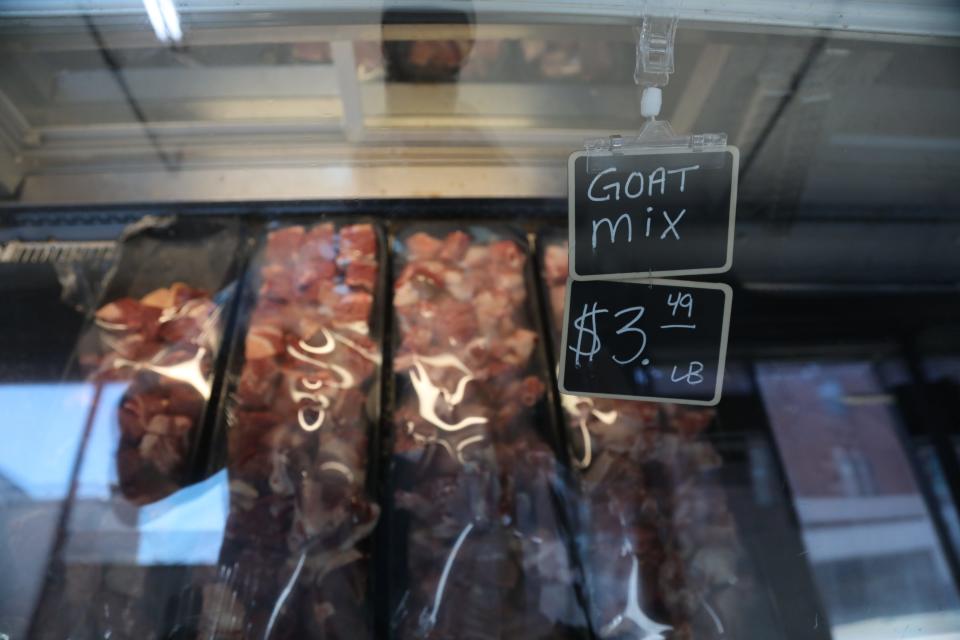NJ halal slaughterhouse faces 'overwhelming' pace ahead of Muslim holiday
PATERSON, N.J. — The barn teemed with the baas of wooly sheep, the mooing of cows and the munching of goats – nearly 2,000 livestock tucked away at the end of a street in an industrial part of Paterson, New Jersey.
The animal abode is part of ENA Meat Packing, a 33-year-old halal slaughterhouse among the largest of its kind in the U.S. The family-owned operation harvests more than 400,000 animals each year according to Islamic standards.
In normal times, ENA is flooded with orders from butcher shops and grocery stores serving the large and growing Muslim community in northern New Jersey. But this week, the pace is even faster, with the company in the midst of its busiest period of the year leading up to Eid al-Adha, the Feast of the Sacrifice, which starts Saturday.
“It is overwhelming,” said Edibey Kucukkarca, ENA's chief executive officer, during a recent tour. “There are a lot of moving parts and a lot of people. We basically work with wholesalers and butcher shops, but during this time of year, we work with a lot of retail and outside customers. Our slaughter process is tenfold those three days.”

One of two major Muslim holidays, Eid al-Adha commemorates the willingness of the Prophet Abraham to sacrifice his son for God. Before he could do so, God stopped Abraham, whom Muslims know as Ibrahim, and gave him a ram to sacrifice instead, according to the Quran and the Bible.
Eid al-Adha 2022: When is the Muslim holiday observed in the US and how is it celebrated?
During the holiday, lasting three or four days, Muslims arrange for the slaughter of a goat, sheep or cow and share a third of the meat with family and friends and another third with the poor. The Islamic tradition of sacrifice is commonly called qurbani or udhiya. Some will donate to charities that conduct the sacrifice and provide meat for families in the U.S. and abroad.
The humanitarian arm of the Islamic Circle of North America, ICNA Relief, bought 500 livestock to provide 5-pound boxes of meat to families in need throughout the Northeast, said Arshad Jamal, the regional director. With inflation increasing the cost of living, families welcome the aid, Jamal said.
The tradition of sacrifice and charity during Eid unites Muslims across the globe, added Umber Siddiqi, operations and media coordinator for ICNA Relief NJ.
“It’s about being thankful and giving to people in need.”
From Turkey to Paterson
ENA Meat Packing was opened by brothers Ali and Zatibey Kucukkarca, who emigrated to the U.S. from Turkey in the 1970s. In New York City, the entrepreneurial pair of siblings ran businesses including a luncheonette and an apartment building.
In 1989, they got word that the Italian American owner of a Whippany, New Jersey, slaughterhouse was selling his operation. They didn’t have experience in the industry, but they seized on what they saw as a good business opportunity and bought slaughterhouse. For Ali Kuckakkarca, who was a student before he was a businessman, it wasn’t an easy transition.
“When they slaughtered, I couldn’t even go near the door. Little by little, I got used to it,” he said.
He named the business ENA, using the initials of his children's names: Edibey, his son and the current CEO; daughter Nurseda; and Atabey, who runs Senat Poultry, a chicken producer and offshoot of the halal business also based in Paterson.
They found early success filling a specialized and growing market for halal meat but faced a setback in a 2000 fire. The animals, who were kept in a separate location, were unharmed, but the facility was destroyed. After the blaze, they relocated to Paterson, home to a large and expanding Muslim population with roots in the Middle East and Southeast Asia.

About 70% of ENA’s animals come from the family’s 10,000 acre-farm in Lometa, Texas, managed by Ali’s nephew Saffet. The rest are purchased at livestock auctions at farms around the country. From Texas, two drivers take turns at the wheel over some 20 hours to the ENA site.
The animals, free of antibiotics and hormones, are butchered the same day as they arrive and meat is shipped out within 24 hours, according to ENA. Two inspectors and a veterinarian from the U.S. Department of Agriculture work on-site full time ensuring product safety, the company said.
What is halal?
By volume, ENA says it is the biggest operation for halal-only meat in the country, harvesting around 400,000 lamb and goat and nearly 40,000 cows each year. A spokesperson from the USDA Food Safety and Inspection Service said she couldn’t confirm or disclose production volume at the facilities they inspect.
For food to be halal, a Muslim must conduct the slaughter and say a word of prayer, “Bismillah,” meaning “in the name of God." The animal must be healthy and alive at the time, and it must be done by hand swiftly with a sharp knife cut to the neck.
Often, customers will dedicate the animal they purchase in the name of a loved one.
Some major meat companies, like National Beef and JBS Swift, produce halal products on a large scale. There are smaller halal producers scattered around the U.S., with at least five in New Jersey, according to the Food Safety and Inspection Service.

They must undergo inspection to meet FDA standards, but they don’t have to declare whether they are halal to the federal agency.
ENA said the business does not stun animals, which typically involves giving livestock a shock or a blow to the head to immobilize them before they are killed. Some halal slaughterhouses do employ this method and Islamic views on the permissiveness of stunning before slaughter vary.
Choosing an animal
The only time FDA inspectors are not present is during the Eid al-Adha holiday, when there is a religious exemption and when ENA provides what it calls "custom slaughter." Families visit and choose the animal they’d like, which is then prepared while they wait. The process can be done in about 90 minutes.
This will be the first custom slaughter in three years, after the service was suspended due to COVID. Prices have spiked due to a rise in overall meat costs, with a whole lamb or goat selling for about $600 and cows for $4.99 per pound, according to ENA's website. But the increase hasn’t lessened demand.
Customers are plentiful, and they prefer to get their meat on the first day of Eid al-Adha, Ali Kucukkarca said.
“We are a little nervous,” he added. "We are trying to make everybody happy. Everybody wants it at the same time and same day and that’s not possible. We’re going to try our best.”
According to the Pew Research Center, New Jersey is the state with the highest proportion of Muslims, at 3% of the population, or about 270,000 people. As the community has grown, so has ENA’s business. In the past two years alone, sales have doubled, said Edibey Kucukkarca. To keep up, they are building a new 75,000-square-foot facility next door.

The annex, due to open in November, will be able to process four times the number of livestock. It will feature automation to make labor easier, more efficient and cheaper. ENA expects to double its employees to 100 when the expansion is done.
In keeping with halal tradition, slaughtering will continue to be conducted by hand.
"There've been times where it's been so overwhelming, where we say we should shut down during those days," Edibey Kucukkarca said as he walked though the busy work floor.
"My father and grandfather say absolutely not. It's a religious service. You're impacting people."
Follow Hannan Adely on Twitter: @adelyreporter.
This article originally appeared on NorthJersey.com: NJ halal slaughterhouse prepares for Eid al-Adha holiday

